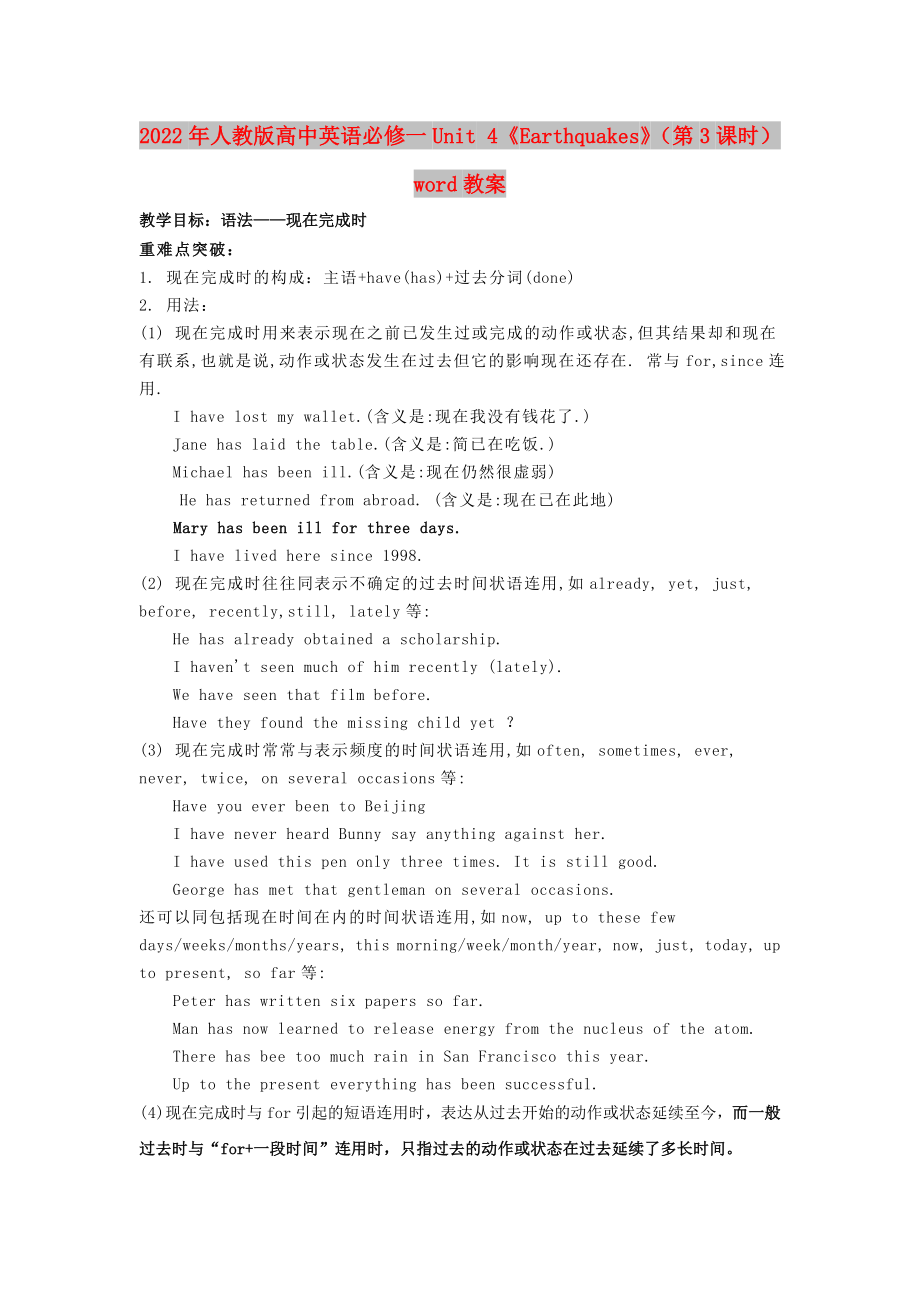《2022年人教版高中英語(yǔ)必修一Unit 4《Earthquakes》(第3課時(shí))word教案》由會(huì)員分享�,可在線閱讀,更多相關(guān)《2022年人教版高中英語(yǔ)必修一Unit 4《Earthquakes》(第3課時(shí))word教案(2頁(yè)珍藏版)》請(qǐng)?jiān)谘b配圖網(wǎng)上搜索�����。
1���、2022年人教版高中英語(yǔ)必修一Unit 4《Earthquakes》(第3課時(shí))word教案
教學(xué)目標(biāo):語(yǔ)法——現(xiàn)在完成時(shí)
重難點(diǎn)突破:
1. 現(xiàn)在完成時(shí)的構(gòu)成:主語(yǔ)+have(has)+過(guò)去分詞(done)
2. 用法:
(1) 現(xiàn)在完成時(shí)用來(lái)表示現(xiàn)在之前已發(fā)生過(guò)或完成的動(dòng)作或狀態(tài),但其結(jié)果卻和現(xiàn)在有聯(lián)系,也就是說(shuō),動(dòng)作或狀態(tài)發(fā)生在過(guò)去但它的影響現(xiàn)在還存在. 常與for,since連用.
I have lost my wallet.(含義是:現(xiàn)在我沒(méi)有錢(qián)花了.)
Jane has laid the table.(含義是:簡(jiǎn)已在吃飯.)
Michael
2����、has been ill.(含義是:現(xiàn)在仍然很虛弱)
He has returned from abroad. (含義是:現(xiàn)在已在此地)
Mary has been ill for three days.
I have lived here since 1998.
(2) 現(xiàn)在完成時(shí)往往同表示不確定的過(guò)去時(shí)間狀語(yǔ)連用,如already, yet, just, before, recently,still, lately等:
He has already obtained a scholarship.
I haven't seen much of him r
3�����、ecently (lately).
We have seen that film before.
Have they found the missing child yet �?
(3) 現(xiàn)在完成時(shí)常常與表示頻度的時(shí)間狀語(yǔ)連用,如often, sometimes, ever, never, twice, on several occasions等:
Have you ever been to Beijing
I have never heard Bunny say anything against her.
I have used this pen on
4、ly three times. It is still good.
George has met that gentleman on several occasions.
還可以同包括現(xiàn)在時(shí)間在內(nèi)的時(shí)間狀語(yǔ)連用,如now, up to these few days/weeks/months/years, this morning/week/month/year, now, just, today, up to present, so far等:
Peter has written six papers so far.
Man has now learned to r
5����、elease energy from the nucleus of the atom.
There has bee too much rain in San Francisco this year.
Up to the present everything has been successful.
(4) 現(xiàn)在完成時(shí)與for引起的短語(yǔ)連用時(shí),表達(dá)從過(guò)去開(kāi)始的動(dòng)作或狀態(tài)延續(xù)至今�����,而一般過(guò)去時(shí)與“for+一段時(shí)間”連用時(shí)����,只指過(guò)去的動(dòng)作或狀態(tài)在過(guò)去延續(xù)了多長(zhǎng)時(shí)間。
We've stayed here for three weeks. 我們?cè)谶@里呆了三個(gè)星期了����。(說(shuō)話時(shí)人還在)
6、���。
He stayed here for three weeks last year. 他過(guò)去曾在這里呆過(guò)三個(gè)星期���。(并不表示現(xiàn)在是否在)
(5) have?gone?to和have?been?to的區(qū)別:
前者表示某人“去某地了”,這個(gè)人已經(jīng)不在這里了����,常用于第三人稱(chēng)�。
后者表示某人“去過(guò)某地�,現(xiàn)在已經(jīng)回來(lái)了”,常與ever等連用可用于各人稱(chēng):
She?has?gone?to?England.?她到英國(guó)去了�����。
She?has?been?to?England.她去過(guò)英國(guó)����。
“Where?is?Tom?”“He?has?gone?to?the?post?office.”(To
7、m目前不在說(shuō)話處)
Have?you?ever?been?there??你曾經(jīng)去過(guò)那里嗎��?(說(shuō)話人you目前在說(shuō)話處)
強(qiáng)化訓(xùn)練:
1. Mother ____me a new coat yesterday. I _______ it on. It fits me well.
A.had made ; have tried B.made ; have tried C. has made ; tried D. made ; tried
2. _____ you ever _____ America ? Yes, I have.
A .Have ; gone to B.
8��、Have��;gone in C. Have�����;been to D. Have�; been in
3.Tom _____up into the tree. Look, he ____ high up there !
A. has got is B. has climbed was C. got was D. climbed is
4.____ you _____ the text yet ? Yes, we ____ it two hours ago.
A.Did copy did B.Have copied have C.Have copied did D.Did
9、 copy had
5. Why ______ she _______ angry ? Because he _____ at her just now .
A. Did get shouted B. Has got shouted
C. Did get has shouted D. Has got has shouted
6. ______you __________ the film before ? Where _____ you ____ it ?
A. Have seen; did see B. Did s
10���、ee did watch
C. Have seen have seen D. Did see have seen
7.You ____ me waiting for two hours. I ____ for you since five.
A. Kept waited B. have kept waited C. Kept have waited D. have kept have waited
8.Where ______ John _______ ? To the library. He _________ there for an hour.
A. Has been has gone B. Has gone has been C. Did go went D. Did be went
 2022年人教版高中英語(yǔ)必修一Unit 4《Earthquakes》(第3課時(shí))word教案
2022年人教版高中英語(yǔ)必修一Unit 4《Earthquakes》(第3課時(shí))word教案

